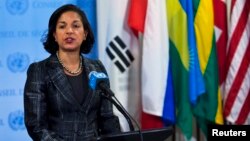UNITED NATIONS —
The United States has submitted to the U.N. Security Council a list of new sanctions to be imposed on North Korea in response to its February 12 nuclear test. The sanctions were agreed to between Washington and Beijing, and now will be considered by the full Security Council, which is expected to adopt them later this week.
U.S. Ambassador Susan Rice said the draft resolution circulated Tuesday to the 15-nation council is the result of three weeks of negotiations between the U.S. and China. It contains tough new sanctions, in addition to strengthening and expanding existing ones.
“The sanctions contained in this draft resolution will significantly impede North Korea’s ability to develop further its illicit nuclear and ballistic missile programs. These sanctions, as well as a commitment to take further significant measures in the event of another launch or nuclear test, will demonstrate clearly to North Korea the continued cost of its provocations,” she said.
Rice told reporters the proposed resolution, which she expects to be adopted unanimously later this week, will carry significant new legal obligations.
“For the first time ever, this resolution targets the illicit activities of North Korean diplomatic personnel, North Korean banking relationships, illicit transfers of bulk cash and new travel restrictions,” she said.
Rice said the United States hopes Pyongyang will change course and recognize that a de-nuclearized Korean peninsula is in North Korea's interest.
China’s envoy, Li Baodong, told reporters that while Washington and Beijing have some differing views, they are united in the common goal of a de-nuclearized Korean peninsula and stopping the illicit spread of nuclear technology.
“China is against that nuclear test conducted by DPRK, so we support the action taken by the Security Council. We think that action should be proportionate, should be balanced and focus on bringing down the tension and focusing on [the] diplomatic track," said Li. "And also a strong signal must be sent out that nuclear test is against the will of the international community. So [we’ve] got to bring an end to that program. That’s why we need a strong signal from the international community.”
Ambassador Li said Beijing is very concerned about peace and stability in Asia, and would like to see all the parties return to talks and address their concerns through diplomacy.
Diplomats who have seen the proposed text say it includes new financial sanctions, as well as sanctions governing the search and seizure of suspect vessels entering or leaving North Korean territory.
In January, the Security Council warned North Korea that if it conducted another nuclear test or ballistic missile launch it would face biting new sanctions. Pyongyang dismissed the warning and conducted a nuclear test on February 12, bringing on this new round of potential sanctions.
U.S. Ambassador Susan Rice said the draft resolution circulated Tuesday to the 15-nation council is the result of three weeks of negotiations between the U.S. and China. It contains tough new sanctions, in addition to strengthening and expanding existing ones.
“The sanctions contained in this draft resolution will significantly impede North Korea’s ability to develop further its illicit nuclear and ballistic missile programs. These sanctions, as well as a commitment to take further significant measures in the event of another launch or nuclear test, will demonstrate clearly to North Korea the continued cost of its provocations,” she said.
Rice told reporters the proposed resolution, which she expects to be adopted unanimously later this week, will carry significant new legal obligations.
“For the first time ever, this resolution targets the illicit activities of North Korean diplomatic personnel, North Korean banking relationships, illicit transfers of bulk cash and new travel restrictions,” she said.
Rice said the United States hopes Pyongyang will change course and recognize that a de-nuclearized Korean peninsula is in North Korea's interest.
China’s envoy, Li Baodong, told reporters that while Washington and Beijing have some differing views, they are united in the common goal of a de-nuclearized Korean peninsula and stopping the illicit spread of nuclear technology.
“China is against that nuclear test conducted by DPRK, so we support the action taken by the Security Council. We think that action should be proportionate, should be balanced and focus on bringing down the tension and focusing on [the] diplomatic track," said Li. "And also a strong signal must be sent out that nuclear test is against the will of the international community. So [we’ve] got to bring an end to that program. That’s why we need a strong signal from the international community.”
Ambassador Li said Beijing is very concerned about peace and stability in Asia, and would like to see all the parties return to talks and address their concerns through diplomacy.
Diplomats who have seen the proposed text say it includes new financial sanctions, as well as sanctions governing the search and seizure of suspect vessels entering or leaving North Korean territory.
In January, the Security Council warned North Korea that if it conducted another nuclear test or ballistic missile launch it would face biting new sanctions. Pyongyang dismissed the warning and conducted a nuclear test on February 12, bringing on this new round of potential sanctions.











